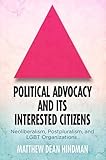Political Advocacy and Its Interested Citizens : Neoliberalism, Postpluralism, and LGBT Organizations / Matthew Dean Hindman.
Material type: TextSeries: American Governance: Politics, Policy, and Public LawPublisher: Philadelphia : University of Pennsylvania Press, [2018]Copyright date: ©2019Description: 1 online resource (264 p.) : 7 illusContent type:
TextSeries: American Governance: Politics, Policy, and Public LawPublisher: Philadelphia : University of Pennsylvania Press, [2018]Copyright date: ©2019Description: 1 online resource (264 p.) : 7 illusContent type: - 9780812296655
- online - DeGruyter
| Item type | Current library | Call number | URL | Status | Notes | Barcode | |
|---|---|---|---|---|---|---|---|
 eBook
eBook
|
Biblioteca "Angelicum" Pont. Univ. S.Tommaso d'Aquino Nuvola online | online - DeGruyter (Browse shelf(Opens below)) | Online access | Not for loan (Accesso limitato) | Accesso per gli utenti autorizzati / Access for authorized users | (dgr)9780812296655 |
Frontmatter -- CONTENTS -- INTRODUCTION. The Advocacy Era -- CHAPTER 1. Beyond “Who Governs?” Interest Group Representation in the New Gilded Age -- CHAPTER 2. “Our Sunday Best” Homophile Citizenship and Identity Building Before Stonewall -- CHAPTER 3. “From the Closet If Necessary” The Dawn of the Advocacy Era and the Circumscription of Political Participation -- CHAPTER 4. “Promiscuity of the Past” Gay Advocacy and Gay Sexuality Pre-and Post-AIDS -- CHAPTER 5. Acting Up in a Time of Crisis ACT UP and the Limits of an Interested Citizenry -- CONCLUSION. An Interesting Dilemma -- APPENDIX. Research Methodology and Archival Data -- NOTES -- WORKS CITED -- INDEX -- ACKNOWLEDGMENTS
restricted access online access with authorization star
http://purl.org/coar/access_right/c_16ec
Advocates representing historically disadvantaged groups have long understood the need for strong public relations, effective fundraising, and robust channels of communication with the communities that they serve. Yet the neoliberal era and its infusion of money into the political arena have deepened these imperatives, thus adding new financial hurdles to the long list of obstacles facing minority communities. To respond to these challenges, a professionalized, nonprofit model of political advocacy has steadily gained traction. In many cases, advocacy organizations sought to harness and redirect the radical verve that characterized the protest movements of the 1960s into pragmatic, state-sanctioned approaches to political engagement.In Political Advocacy and Its Interested Citizens, Matthew Dean Hindman looks at how and why contemporary political advocacy groups have transformed social movements and their participants. Looking to LGBT political movements as an exemplary case study, Hindman explores the advocacy explosion in the United States and its impact on how advocates encourage citizens to understand their role in the political process. He argues that current advocacy groups encourage members of the LGBT community to view themselves as stakeholders in a common struggle for political incorporation. In doing so, however, they often overshadow more imaginative and transformational approaches that could unsettle and challenge straight society and its prevailing political and sexual norms. Advocacy groups carved out a space within a neoliberalizing political process that enabled them to instruct their members, followers, and constituents on serving effectively as industrious political claimants. Political Advocacy and Its Interested Citizens thus sheds light on grassroots politics as it is practiced in present-day America and offers a compelling and original analysis of the ways in which neoliberalism challenges citizens to participate as consumers and investors in the advocacy marketplace.
Mode of access: Internet via World Wide Web.
In English.
Description based on online resource; title from PDF title page (publisher's Web site, viewed 26. Mai 2021)


